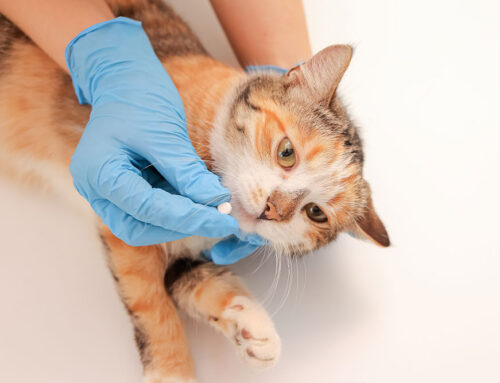Pet owners are close with their pets—relationally and physically. During some of these close encounters—slobbery kisses, belly rubs, and snuggles—you have likely wondered if your pet can transmit diseases to you. Our WesVet Animal Hospital team answers your most pressing questions about zoonotic disease transmission, and how to avoid contracting these illnesses.
Question: What is a zoonotic pet disease?
Answer: Zoonotic diseases, which are caused by germs, such as viruses, bacteria, parasites, and fungi, can be transmitted between species—from animals to humans. Keep in mind that although your pet appears healthy, they may be carrying germs that can make you and your family sick.
Q: How are zoonotic pet diseases transmitted to people?
A: Zoonotic pet diseases can be highly contagious. Your pet can transmit zoonotic disease-causing germs in several ways, including:
- Direct contact — Transmission can occur by coming in contact with an infected pet’s saliva, blood, urine, mucous, feces, or other body fluids.
- Indirect contact — Transmission can occur by coming in contact with an item, such as a toy, which an infected pet has contaminated with their bodily fluids.
- Bites — Transmission can occur through a bite from an infected insect (i.e., vector-borne transmission), such as a tick, mosquito, or flea.
- Food — Transmission can occur by eating contaminated animal products, such as unpasteurized milk or undercooked meat. Zoonotic pet disease transmission can also occur if you have not washed your hands before eating after handling an infected pet.
- Water — Transmission can occur by drinking water contaminated with an infected pet’s urine or feces.

Q: Who is at risk of serious illness from zoonotic pet diseases?
A: While anyone can become ill by contracting a zoonotic disease, some people are more likely to become seriously ill—such as children younger than 5 years of age, adults older than 65 years of age, immunocompromised people, and pregnant women.
Q: What diseases can your pet transmit to you and your family?
A: Pets are at risk for contracting several zoonotic diseases—some of which can be life-threatening to your pet and to you. The most common diseases your pet can transmit to you and your family include:
- Rabies — Rabies is a viral disease that is usually transmitted through an infected animal’s bite. In the United States, mandatory pet rabies vaccination and animal control programs have made human rabies cases nearly nonexistent. However, if a potentially rabid pet or animal bites you, seek medical attention immediately, as the disease has a high fatality rate.
- Toxoplasmosis — Cats most commonly contract this parasitic infection, and you can contract the disease—which your cat passes through their feces—when you clean their litter box. Most healthy people do not contract the disease, however pregnant women and immunocompromised people can develop serious health complications if they are infected. To reduce your transmission risk, change your cat’s litter often, and always wash your hands after cleaning the litter box.
- Hookworms and roundworms — Puppies and kittens are most susceptible to these intestinal parasites. Infected pets’ eliminated stool is infested with these parasites’ eggs, which hatch and become larvae. You can be infected when you come in contact with contagious feces an infected pet or wild animal has left in the dirt. To prevent infection, always wear shoes and gloves to avoid direct skin contact with sand or soil.
- Ringworm — Despite the name, ringworm is caused by a fungus, and can be transmitted by petting or grooming an infected pet. You can also contract ringworm by touching an object or surface that has been in contact with the fungus, such as towels, bedding, brushes, and—in rare cases—prolonged contact with highly infected soil. A ringworm rash can be treated with an over-the-counter antifungal cream.
- Lyme disease — While you cannot contract Lyme directly from your pet, you are at risk of being bitten by an infected tick that has hitched a ride on their fur. Without prompt treatment, Lyme disease can become a chronic condition, causing you to experience nerve and heart inflammation, mental changes, and pain. To reduce your Lyme disease risk, regularly check your pet for ticks, and avoid tick-infested areas.
- Salmonella — Salmonella are bacteria that can live in the intestinal tract. While human infection usually occurs from eating contaminated food, your pet can spread Salmonella through their feces or saliva. You can contract this disease if you touch your face or mouth with unwashed hands after coming in contact with a contaminated item. The best way to avoid Salmonella is to wash your hands thoroughly with soap and water immediately after petting animals, cleaning up their feces, or touching items in their environment.
Q: How can I protect myself and my pet from a zoonotic pet disease?
A: Most zoonotic diseases are easily preventable. To protect yourself and your pet, take the following precautions:
- Wellness exams — Bring your pet in for regular wellness examinations, so our WesVet Animal Hospital team can ensure they are healthy and parasite-free.
- Parasite prevention — Provide your pet with year-round parasite prevention to keep away ticks, fleas, and intestinal parasites.
- Vaccinations — To protect them from preventable diseases, ensure your pet’s vaccinations are current.
- Wash your hands — Improper handwashing is often the reason diseases spread. Always wash your hands—with soap and clean, running water—after being around animals, no matter whether you have touched them.
Life is wonderful with your pet beside you. Remember, by taking simple precautions, you reduce your and your pet’s risk of contracting a zoonotic disease. If your pet is showing illness signs, contact our WesVet Animal Hospital team to ensure we diagnose their condition in its earliest, treatable stage—before the disease becomes advanced.







Leave A Comment